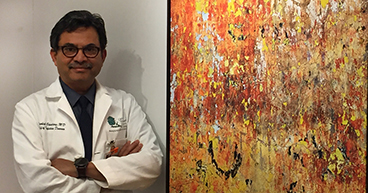
The rhythm of one's life comes from many places. The pace of a morning jog. The rumble of a factory machine. The sway of the trees in the evening breeze. For Dr. Steven Standiford, the rhythm resonates from two disparate sources: music and medicine. Most days, you'll find Dr. Standiford in his role as Chief of Staff and Surgical Oncologist at our hospital in Philadelphia. Other times, he's at his vintage Mason & Hamlin grand piano, playing ragtime and Dixieland or appearing at the renowned Scott Joplin International Ragtime Festival, an annual event in Sedalia, Missouri. Along the way, Dr. Standiford has discovered a balance that has allowed him to excel at both is vocation and avocation, finding "a lot of commonalities between the two," he says. "There is learning to think on your feet, either during a musical performance or an operation. In music, you listen to the many things going on at once—an essential talent in medicine."
Finding rhythm in medicine
"If you think about it, how much rhythm is there in medicine?" he asks. "There are heartbeats. There’s regular breathing. And we pay attention to irregularities in the heartbeat or breathing. But also in the operating room, there’s a rhythm and there’s a flow. There’s the beep-beep-beep of the monitor, which I’m always listening to. And if I hear the beep changing, the rhythm’s a little bit different, and I look up and just make sure everything is okay. What’s different? What’s going on?"
As a boy growing up in New Jersey, Dr. Standiford's path was set on a career in medicine. "I don’t come from a family of doctors," he says, "but there are pictures of me as a boy with a stethoscope around my neck. But then, I had a little deviation, and I almost became a musician. I played in some rock bands and in a jazz trio. I played in a country band and a polka band. The polka band was great. It was 40 bucks a night, and that was good money in 1974. But when you’re riding in a ’67 Impala with unmatched fenders and the guy leading the band is excited just because the car runs, maybe you should find something that’s a little more secure."
Connecting with patients
Dr. Standiford has been playing ragtime piano since 1972. The following year, the movie The Sting, featuring the music of ragtime legend Scott Joplin, created soaring demand for the musical genre. "I was already playing this stuff and instantly had work," Dr. Standiford says. "It made a musical geek popular. I was out playing three or four nights a week because everybody wanted ragtime." But by 1977, music took a back seat while Dr. Standiford attended medical school and completed internships and residencies. His two loves intersected once again years later, when his medical career led him to Missouri, the birthplace of ragtime music and home to the Joplin Festival. "I started going to the Scott Joplin Festival, and then started playing at the Scott Joplin Festival," he says. "And I was back there this year performing for my 19th year." According to his festival bio, Dr. Standiford wears many hats at the festival, including "solo piano, tuba, singing, or playing second piano … serving as master of ceremonies, or generally hanging out enjoying the music and all our ragtime friends."
Dr. Standiford often uses music to reach out and connect with patients, some of whom have offered to sing with him or bring in a guitar and play a duet. Others have watched him play on one of his several YouTube videos. For patients who are musically inclined or play an instrument, Dr. Standiford looks for other ways to connect and learn what makes each unique. "If I know that there’s any kind of musical thing, I make sure that comes into the equation," he says. "I make it a point with every patient I see to know one little quirky thing about them, because, they know that I’m connecting with them and it gives me a way to remember what’s special about that given patient."
Learn more about mind-body medicine, including music therapy.



